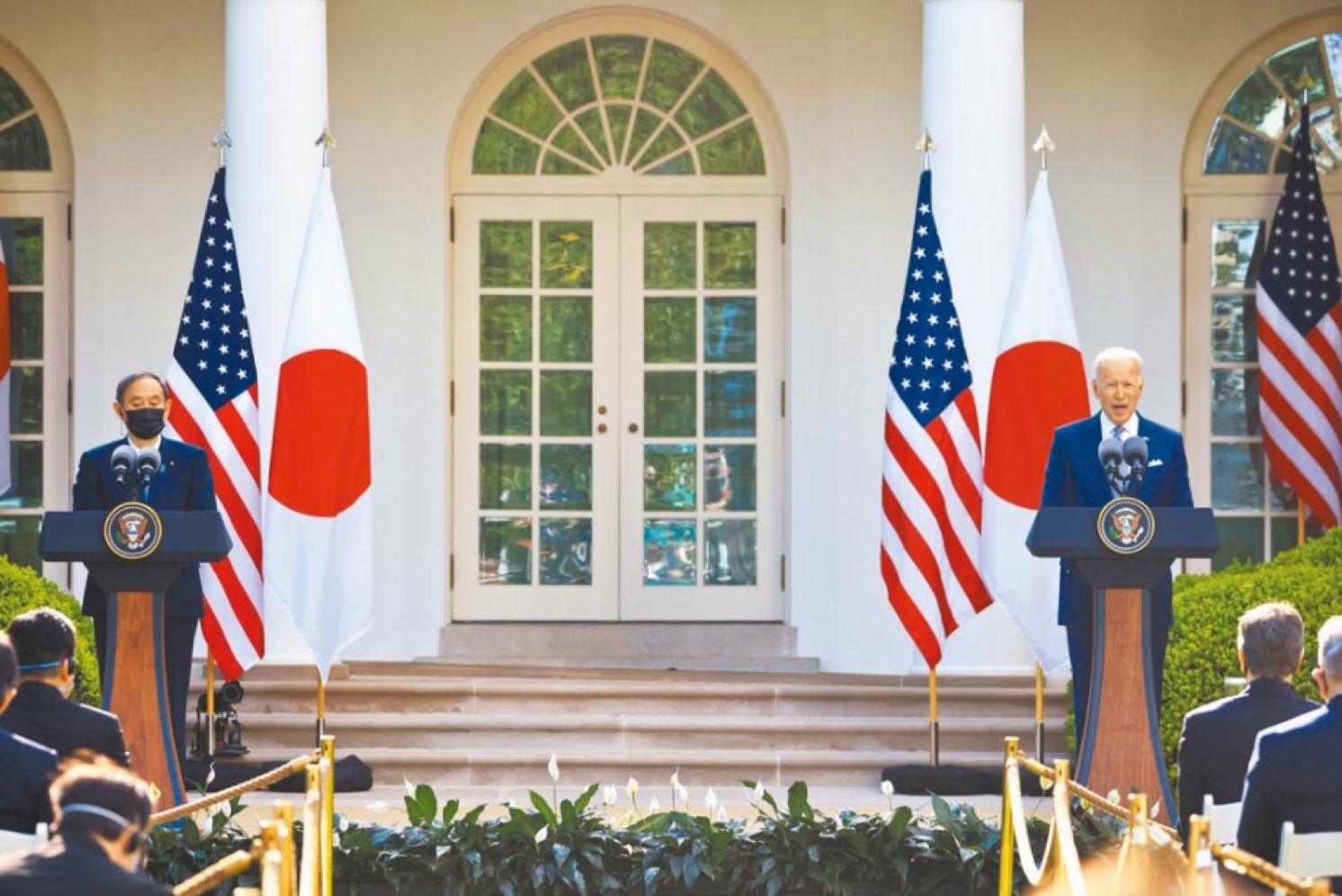
U.S.-Japan Summit Reaffirms Significance of Cross-Strait Peace and Stability
China Times, April 18, 2021
Prime Minister Yoshihide Suga of Japan and President Joe Biden of the United States held their first face-to-face Meeting at the White House in the early morning on April 17, Taiwan time. In the Joint Statement after the Meeting, two leaders rarely expressed their concern about the situation in the Taiwan Strait, stating that "We emphasize the importance of peace and stability in the Taiwan Strait and encourage the peaceful resolution of cross-strait issues." The leaders of the United States and Japan are also "deeply concerned" about the human rights issues in Hong Kong and Xinjiang, as well as the situation in the East China Sea and the South China Sea, and reaffirmed that Diaoyutai Islands (called the Senkaku Islands in Japan) is applicable to Article V of the U.S.-Japan Security Treaty.
Cross-Strait Issues: Suga and Biden Call for Peace
The last U.S.-Japan leaders’ Joint Statement mentioning Taiwan was in 1969 during the Cold War when Japanese Prime Minister Eisaku Sato visited Washington and had talks with U.S. President Richard Nixon. Japan’s Kyodo News Agency specifically pointed out that this is the first time it has been mentioned in 52 years, and it is also the first time since the normalization of Sino-Japanese relations in 1972. After the meeting, Suga told the media about the situation in the Taiwan Strait and the Senkaku Islands that while tensions continue, the leaders of the United States and Japan have reached a consensus on making peaceful resolution the top priority.
The Statement of the U.S.-Japan Summit pointed out that “We emphasize the importance of peace and stability in the Taiwan Strait and encourage the peaceful resolution of cross-strait issues.” The first half of this statement has appeared in the “2 plus 2” Meeting between the U.S. and Japan’s defense and foreign ministers in March. This time there is an additional statement as the second half, i.e., "Encourage the peaceful resolution of the cross-strait issue". This is the standard position of the Japanese government every time it touches the Taiwan issue, showing that its attitude has not changed. However, the Japanese media pointed out that the U.S.-Japan Joint Statement touched on Taiwan, which undoubtedly will strongly sting China's nerves.
Deep Concern About Human Rights in Xinjiang and Hong Kong
The Joint Statement of the Summit is titled "U.S.-Japan Global Partnership for a New Era", which asserts “to build a free and open Indo-Pacific” as the top priority of the U.S.-Japan alliance. Japan is determined to strengthen its defense capabilities and further consolidate its alliance and regional security. The United States reiterated its "unwavering support" for Japanese defense and promised to use various capabilities, including nuclear. The leaders of the United States and Japan once again confirmed that Diaoyutai Islands is the subject applicable to Article V of the U.S.-Japan Security Treaty, which stipulates American defense obligations. The statement expressed opposition to any unilateral action that seeks to undermine Japan's administration of the Senkaku Islands.
The statement promised to strengthen cooperation to deal with China, criticizing China's actions as "violating the rules-based international order, including economic and other forms of coercion." The United States and Japan confirmed the importance of "deterrence" to maintain regional peace and stability. American and Japanese leaders also stated that they are "deeply concerned" about the Chinese authorities' human rights issues in Xinjiang and Hong Kong, and oppose any unilateral attempts to change the status quo in the East China Sea. Suga said that he and President Biden agreed that both Japan and the United States need to have candid conversations with China.
Measures Dealing with Unfair Trade, Targeting China
The United States and Japan have also promised to invest 2.5 billion US dollars and $2 billion in 5th generation (5G) wireless networks or more advanced network technology, and will also increase investment in artificial intelligence (AI) and semiconductor supply. The two countries emphasized that they will continue to deal with unfair trade measures, such as infringement of intellectual property rights, forced technology transfer, or market-distorting subsidies, through bilateral, G7, and World Trade Organization (WTO) cooperation mechanism. These statements also seem to be a sword pointing China.
In addition, Prime Minister Suga gave a speech at an online seminar hosted by the Center for Strategic and International Studies (CSIS). Regarding the China issue, Suga pointed out that, in addition to political and economic aspects, China has also rapidly expanded its influence in the military. The attempt to unilaterally change the status quo by force continues to exist in the East China Sea and the South China Sea. He emphasized that on matters of sovereignty, democracy, human rights, and the rule of law and other universal values, Japan will not give in. Suga also said that Japan will firmly speak for the human rights situation in Myanmar, Xinjiang, and Hong Kong, and cooperate with the international community to seek concrete actions of improvement in China.
Prior to the U.S.-Japan Summit, Spokeswoman Jen Psaki of the White House stated that the United States and Japan share a common position on the Taiwan issue. She also criticized China's increased coercive actions against Taiwan and intended to weaken Taiwan's democracy, which the United States believed might undermine the regional stability.
From: https://www.chinatimes.com/newspapers/20210418000293-260118